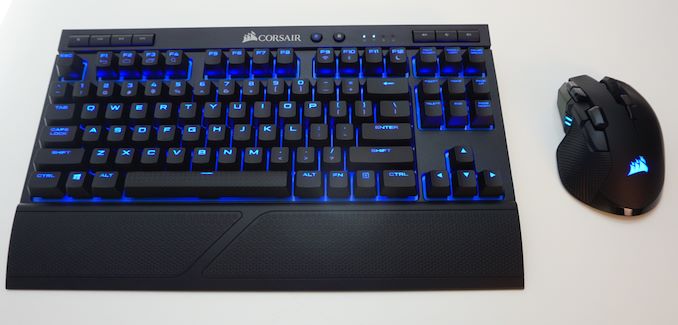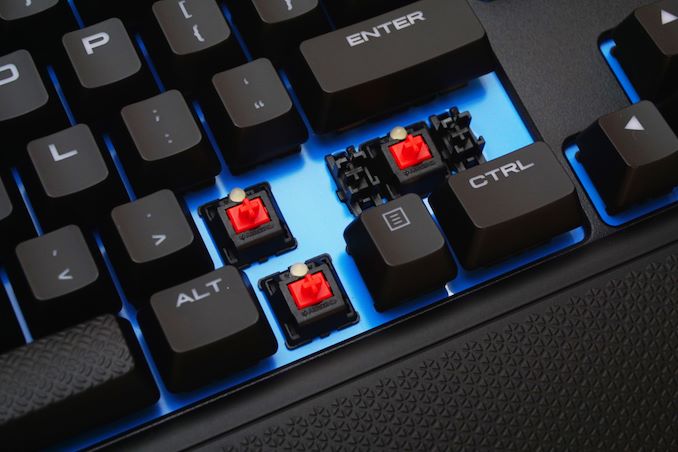The Corsair K63 Wireless Mechanical Keyboard Review: PC Gaming Untethered
by E. Fylladitakis on September 16, 2019 10:30 AM ESTConclusion
Corsair developed the K63 Wireless Mechanical keyboard primarily for living room gaming. And while, Corsair has made some trade-offs to get here, when combined with the optional Corsair Lapboard and a wireless gaming mouse like the Corsair Ironclaw, it forms an ideal setup for couch gaming. It can also be used as a wireless keyboard for a gaming laptop while connected to an external 5V power source or to another PC, making it particularly useful to users who want a desktop capable of switching between devices.
In terms of quality, the Corsair K63 is a well-designed, robust keyboard. Corsair mixed the design of the K65/K95 series with that of the Strafe with very good results, creating a solid and relatively lightweight portable mechanical keyboard. Cherry’s MX switches never disappoint, showing exceptional stability and quality over and over again. Aesthetically, the plastic-shelled keyboard certainly loses some points over the aluminum-based designs of the K65/K95 keyboards but, despite that plastic chassis, it remains elegant and ideal for modern desktops and living rooms. The real issue with the design of the K63 probably is the classic recessed keys area that, unlike flat designs with “floating” keys, traps dust and debris and requires frequent cleaning - an issue that will probably be bourgeoned during living room use.
With any wireless product – but especially one in a relatively new field like wireless mechanical keyboards – comes the question of battery life, and here Corsair's keyboard doesn't excel, but it does offer a reasonable compromise. On the whole, the K63's battery life is sufficient and it will easily last through daily gaming sessions, but at the same time it can't match typical wireless office keyboards, whose battery life of which is measured in months, or even years. With the backlighting disabled, you're looking at a few days of battery life, while enabling the beautiful-but-expensive backlighting will bring the K63 down to just a day of battery life.
Overall, the Corsair K63 is excellent quality product, but it is not a keyboard for everyone. Corsair made a gaming-focused keyboard with the K63, and that's certainly where it shines. The tenkeyless design is a trade-off in and of itself, but unless you need it for gaming, then the small size of the keyboard can enhance a gamer’s experience by improving mouse handling and space. On the flip side, however, this isn't a portable version of Corsair's most advanced keyboards – it's a K63 rather than a K95 for a reason – so gamers looking for the most advanced keyboard on the market may find the keyboard coming up short. In particular, the limited number of keys may constrain gamers who are used to having a great number of macros and other advanced functions.
Meanwhile, office/productivity users will want to look elsewhere entirely. The trade-offs made for a gaming keyboard don't make as much sense for general use, especially with the lack of a numpad.
As for portability, the K63 is a reasonably small keyboard; but it is not quite small and lightweight enough for frequent transportation. This goes hand-in-hand with the battery life of the keyboard, which although is reasonable for the segment, it is still is measured in days, making it better than a smartphone, but worse than something like a game controller.












75 Comments
View All Comments
Marlin1975 - Monday, September 16, 2019 - link
So, how much does it cost to get a product "reviewed" and listed on the front page now?Sivar - Monday, September 16, 2019 - link
How much are you paid to "post" FUD on review websites?Marlin1975 - Monday, September 16, 2019 - link
Haha I see you do not even know what FUD means. Please tell me how this related to my post?Sivar - Monday, September 16, 2019 - link
Fear, uncertainty, and doubt about the legitimacy of Anandtech due to an implication that their content is less about reviewing and more about paid (and therefore biased) marketing.Unless I misinterpreted your post, which may indeed be true, this seems to track.
Marlin1975 - Monday, September 16, 2019 - link
You should look it up as you are not even close. FUD is a disinformation strategy. No where have I tried to present false information let alone present another option as a better product/source.PeachNCream - Monday, September 16, 2019 - link
From: https://whatis.techtarget.com/definition/FUD-Fear-...-FUD (Fear, Uncertainty, and Doubt) is the term for any strategy intended to make a company's customers insecure about future product plans with the purpose of discouraging them from adopting competitors' products. For example, "You can try using X instead of our product, but you may lose all your data."
By implying that there is an undisclosed exchange of money in the asking of the question you did, you are indeed acting to spread FUD, attempting to discourage people from relying on a product, Anandtech reviews, through the spread of disinformation. While you aren't very strategic or subtle about it as the effort is akin to surgery with a blunt chainsaw, you are still making the attempt. Your confidence if yourself is presently misplaced.
Oliseo - Monday, September 16, 2019 - link
"No where have I tried to present false information"Apart from your original statement you mean. Remember, false information doesn't have to be spread explicitly, as you yourself prove when you implicitly did so.
Unless you have proof or your insinuations?
What's that, you don't... Never would have guessed.
ballsystemlord - Monday, September 16, 2019 - link
His question is legitimate, although you can argue he could have stated it differently.broberts - Monday, September 16, 2019 - link
No the question was posed in a manner intended to insinuate a particular behavior. Use of quotes around reviewed is a clear indication of the intentional slur. Had the poster intended a legitimate inquiry the question would have been worded differently.ballsystemlord - Tuesday, September 17, 2019 - link
Hmmm. You're correct. It's a legitimate question, but the quotes give away an intentional slur.